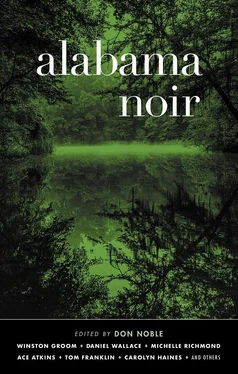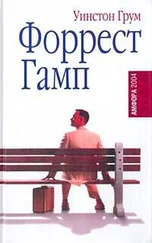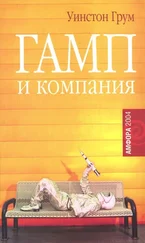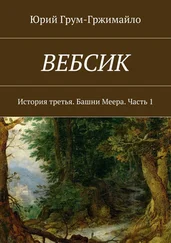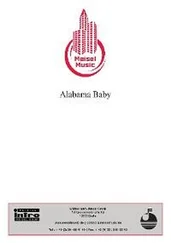Уинстон Грум - Alabama Noir
Здесь есть возможность читать онлайн «Уинстон Грум - Alabama Noir» весь текст электронной книги совершенно бесплатно (целиком полную версию без сокращений). В некоторых случаях можно слушать аудио, скачать через торрент в формате fb2 и присутствует краткое содержание. Город: New York, Год выпуска: 2020, ISBN: 2020, Издательство: Akashic Books, Жанр: Детектив, на английском языке. Описание произведения, (предисловие) а так же отзывы посетителей доступны на портале библиотеки ЛибКат.
- Название:Alabama Noir
- Автор:
- Издательство:Akashic Books
- Жанр:
- Год:2020
- Город:New York
- ISBN:978-1-61775-914-7
- Рейтинг книги:4 / 5. Голосов: 1
-
Избранное:Добавить в избранное
- Отзывы:
-
Ваша оценка:
- 80
- 1
- 2
- 3
- 4
- 5
Alabama Noir: краткое содержание, описание и аннотация
Предлагаем к чтению аннотацию, описание, краткое содержание или предисловие (зависит от того, что написал сам автор книги «Alabama Noir»). Если вы не нашли необходимую информацию о книге — напишите в комментариях, мы постараемся отыскать её.
Alabama Noir — читать онлайн бесплатно полную книгу (весь текст) целиком
Ниже представлен текст книги, разбитый по страницам. Система сохранения места последней прочитанной страницы, позволяет с удобством читать онлайн бесплатно книгу «Alabama Noir», без необходимости каждый раз заново искать на чём Вы остановились. Поставьте закладку, и сможете в любой момент перейти на страницу, на которой закончили чтение.
Интервал:
Закладка:
“We didn’t have to come here tonight. You wanted this, whatever this is. Like in that song you love, when the man takes Polly riding into the night, toward her death, she knows where he’s taking her. He even tells her that her guess is about right, but it wasn’t a guess. It’s what she wanted.”
“That’s one version,” she said.
“It’s your version. Child that I am, as you say, I know you better than you think.”
“I don’t think you do,” she said, ready to push him now, goad him, play on his anger for the moment, later on his fears. She knew them, including one he’d never given voice to but was there, waiting for her to use.
“I’ve seen pictures of you as a teenager,” he said, “the ones you showed me where you’re wearing all that black, the crazy hair, the black makeup and fingernails. You were all Goth. Death as pretend. Little death. You’ve been drawn to it all your life, like some drug you want. Killing your husband and baby was the closest you’ve come. It wasn’t enough, was it? Just made you crave it more, thought it gave you all the more reason for wanting it. Fucking over a grave was foreplay for you.”
She waited to speak, bided her time, wanted to steel herself for all that would come. Then he began to play simple notes again, and she recognized the song she needed to hear but didn’t realize it until she heard the title line in the melody as he played “I’ll Never Get Out of This World Alive.” She could not look at him now, but she began, hesitantly. “That man in prison,” she said, “the one who wouldn’t leave you alone.”
He stopped playing. “What about him? Why bring him up now?” He looked toward the two headstones, appeared to read the engraved words, but she knew it was too dark for him to read them. He then began to sound two notes on the fretboard, the second note flat, the D string out of tune. He turned the tuning peg, tightening the string, hit the two notes again, waiting on her, she knew, looking for comfort inside the sound of the instrument.
“It wasn’t the way you told me, was it?” she said, ready now to push him beyond an irrevocable point. “He didn’t force you. You wanted it, and kept wanting it.”
He tightened the string again, hit the note that now grew sharper, and sharper again with another turn of the peg, and he kept striking the note, the sound climbing.
“You liked it. But you couldn’t live with wanting a dick. That’s why you killed him. So nobody would know.”
He twisted the peg hard, the sound beyond sharp, and she heard the sudden, awful snap of the metal, bronze-wound string. It sprang from the neck, and he caught a broken end, pulled its other end from out of the body of the guitar and held the two ends of the heavy-gauge string in his closed, tightened hands. She knew what he now wielded, and her blood surged and then seemed to thin, and she felt as if she were being lifted higher, climbing her way toward something without effort. All she had to do was let him bear her, not fight.
He raised his hands, the string taut between them, and in one motion threw it past her and toward Hank’s grave where it landed on his engraved marble slab, rolled toward the far edge.
She didn’t speak at first, waited only to see if his anger would show itself, but he neither moved nor spoke.
“You broke it on purpose,” she said. “For no reason? Just to throw it away?”
He took a slow breath, as if to mark the end of contemplation. “You know it wasn’t like that. The man did me harm, like you can’t imagine, unless you’ve suffered that and haven’t told me. Have you suffered it?”
“No,” she said, “not that.”
“Then why claim what you just claimed to know about me?” He lowered his guitar into the case, sat upright again, his back rigid, as if he were bracing or preparing himself for something he expected from her. “You had a reason. I want to hear you say it.”
Now she felt afraid, not of what he might do, but afraid to articulate the lie she’d told herself, afraid to reveal some empty, unfillable place within her for him to judge.
“You can’t answer. It’s all right.” He placed his right arm over her shoulder, gently. “I know the reason, and I know where you want to go.” He drew his arm higher, closer, pulled her toward him, intoning her name, and began to squeeze, his forearm now tight against the side of her neck, his bent elbow the spring-loaded hinge in a closing wedge. “I’m going to take you past where you want to go. Do you hear me? Are you prepared?” She felt his left hand upon her bare throat, felt his fingers tighten. She could not move her head, did not try. “ Past it, and you’ll awake with breath. Are you ready?”
She could not answer with words, could only feel his hand closing, cutting off any form of utterance he might understand. All she could do was whimper.
About the Contributors
Ace Atkinswas born in Troy, Alabama, in 1970 and attended high school and college in Auburn, where he played football. Atkins has been nominated for every major award in crime fiction, including the Edgar three times. He has written nine books in the Quinn Colson series and continued Robert B. Parker’s iconic Spenser character after Parker’s death in 2010, adding seven best-selling novels in that series. He lives in Oxford, Mississippi, with his family.
Marlin Bartonlives in Montgomery. He has published three story collections: Pasture Art, Dancing by the River, and The Dry Well; and two novels: The Cross Garden and A Broken Thing. His stories have appeared in Prize Stories 1994: The O. Henry Awards and The Best American Short Stories 2010. He teaches in a program for juvenile offenders called Writing Our Stories, and he also teaches in the low-residency MFA program at Converse College.
D. Winston Brownwas born at Holy Family Community Hospital in Ensley, Alabama, a neighborhood on the west side of Birmingham, and he grew up in nearby Bush Hills. He went on to graduate from Ramsay High School, and later from the University of Alabama at Birmingham. He has published both fiction and creative nonfiction. He now works in Florence, Alabama, but still lives and writes in Birmingham.
Kirk Curnuttwas born in Lincoln, Nebraska, in 1964 but has lived in Montgomery, Alabama — the hometown of Zelda Fitzgerald — since 1993. He is the author of three novels: Breathing Out the Ghost, Dixie Noir, and Raising Aphrodite, as well as nonfiction studies of F. Scott Fitzgerald, Ernest Hemingway, William Faulkner, Gertrude Stein, and the 1970s. Every day he travels the route outlined in his contribution to this volume while commuting to nearby Troy, Alabama.
Tom Franklin, from Dickinson, Alabama, is the author of Poachers: Stories and three novels, Hell at the Breech, Smonk, and Crooked Letter, Crooked Letter, which won the Los Angeles Times Book Prize for Mystery/Thriller, the Willie Morris Prize for Southern Fiction, and the UK’s Gold Dagger Award. His most recent book is The Tilted World, cowritten with his wife, Beth Ann Fennelly. Franklin lives in Oxford, Mississippi, and teaches at Ole Miss.
Anita Miller Garner, born in Coosa County, Alabama, is a descendant of Alabama pioneers. She attended Coosa County High School and the University of Alabama and is Professor Emeritus of English and Creative Writing at the University of North Alabama. Garner is the author of the story collection Undeniable Truths, and fiction editor at Mindbridge Press in Florence, Alabama.
Thom Gossom Jr. was born and raised in Birmingham. He has written a memoir, Walk-On: My Reluctant Journey to Integration at Auburn University; and A Slice of Life, a three-volume collection of short stories. He received his BA from Auburn where he was the first black athlete to graduate from the university. Gossom is also a playwright and working actor, perhaps best known for his recurring roles on Boston Legal and In the Heat of the Night.
Читать дальшеИнтервал:
Закладка:
Похожие книги на «Alabama Noir»
Представляем Вашему вниманию похожие книги на «Alabama Noir» списком для выбора. Мы отобрали схожую по названию и смыслу литературу в надежде предоставить читателям больше вариантов отыскать новые, интересные, ещё непрочитанные произведения.
Обсуждение, отзывы о книге «Alabama Noir» и просто собственные мнения читателей. Оставьте ваши комментарии, напишите, что Вы думаете о произведении, его смысле или главных героях. Укажите что конкретно понравилось, а что нет, и почему Вы так считаете.
